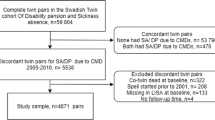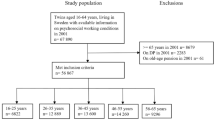Abstract
Purpose
The incidence of disability pension (DP), especially due to mental diagnoses, has increased in many countries, but knowledge of socio-demographic risk factors for DP is limited. Further, the influences of genetics and early-life factors (jointly called familial factors) on these associations remain to be studied. The aims were to study incidence of DP (due to all and mental diagnoses) and associations with socio-demographic factors, and also to establish whether associations differ with DP diagnosis and sex, and are influenced by familial factors.
Methods
A prospective cohort study of all twins born in 1928–1958 (n = 52,609) in Sweden was conducted. The twins were followed from 1993 to 2008 regarding DP. Cox proportional hazard models were applied.
Results
The cumulative incidence of DP was 17 %. Of all the DP diagnoses 20 % were mental. Higher age (≥45 years), being a woman or unmarried, and/or living in a semi-urban area were risk factors for DP. Low education, being a blue-collar worker or being self-employed predicted either higher (all diagnoses) or lower (mental diagnoses) risk of DP. Rural areas were associated with DP due to mental diagnoses. The estimates varied for men and women. After adjustment for familial factors the associations of DP with education and marital status were attenuated and no longer significant. Similar results were apparent for DP due to mental diagnoses and socioeconomic status.
Conclusions
Familial factors may select individuals into some of the established risk environments for DP. Studies investigating the causes of DP need to take such confounding into account.
Similar content being viewed by others
References
Lopez A, Mathers CD, Ezzatti M, Jamision DT, Murray CJL (2006) Measuring the global burden of disease and risk factors, 1990–2001. World Health Report 2001. World Bank
Kessler R, Aguilar-Gaxiola S, Alonso J, Chatterji S, Lee S, Ormel J, Ustun TB, Wang PS (2009) The global burden of mental disorders: an update from the WHO World Mental Health (WMH) surveys. Soc Psychiatry Psychiatr Epidemiol 18:23–33
Wittchen HU, Jacobi F (2005) Size and burden of mental disorders in Europe—a critical review and appraisal of 27 studies. Eur Neuropsychopharmacol 15:357–376
Alonso J, Angermeyer MC, Bernert S, Bruffaerts R, Brugha TS, Bryson H, de Girolamo G, Graaf R, Demyttenaere K, Gasquet I, Haro JM, Katz SJ, Kessler RC, Kovess V, Lepine JP, Ormel J, Polidori G, Russo LJ, Vilagut G, Almansa J, Arbabzadeh-Bouchez S, Autonell J, Bernal M, Buist-Bouwman MA, Codony M, Domingo-Salvany A, Ferrer M, Joo SS, Martinez-Alonso M, Matschinger H, Mazzi F, Morgan Z, Morosini P, Palacin C, Romera B, Taub N, Vollebergh WA (2004) Prevalence of mental disorders in Europe: results from the European Study of the Epidemiology of Mental Disorders (ESEMeD) project. Acta Psychiat Scand Suppl 109(420):21–27
Hensing G, Wahlstrom R (2004) Swedish Council on Technology Assessment in Health Care (SBU). Chapter 7. Sickness absence and psychiatric disorders. Scand J Public Health Suppl 63:152–180
Järvisalo J, Andersson B, Boedeker W, Houtman I (2005) Mental disorders as a major challange in prevention of work disability: experiences in Finland, Germany, the Netherlands and Sweden. The Social Insurance Institution, Finland, Helsinki
OECD (2010) Sickness, Disability and Work: Breaking the Barriers—a synthesis of findings across OECD Countries. Directorate for Employment, Labour and Social Affairs, OECD
Allebeck P, Mastekaasa A (2004) Swedish Council on Technology Assessment in Health Care (SBU). Chapter 5. Risk factors for sick leave—general studies. Scand J Public Health, pp 49–108
Borg K, Hensing G, Alexanderson K (2004) Prediction of future low levels of sickness absence among young persons sick listed with back, neck, or shoulder diagnoses. Work 23:159–167
Krokstad S, Magnus P, Skröndal A, Westin S (2004) The importance of social characteristics of communities for the medically based disability pension. Eur J Public Health 14:406–412
Reinholdt S, Upmark M, Alexanderson K (2010) Health-selection mechanisms in the pathway towards a disability pension. Work 37:41–51
Plomin R, DeFries JC, Mclearn GE, McGuffin P (2008) Behavioral genetics, 5th edn. Worth Publishers, New York
Harkonmäki K, Silventoinen K, Levälahti E, Pitkäniemi J, Huunan-Seppälä A, Klaukka T, Koskenvuo M, Kaprio J (2008) The genetic liability to disability retirement: a 30-year follow-up study of 24,000 Finnish twins. PLoS ONE 3:e3402
Koivumaa-Honkanen H, Koskenvuo M, Honkanen RJ, Viinamaki H, Heikkila K, Kaprio J (2004) Life dissatisfaction and subsequent work disability in an 11-year follow-up. Psychol Med 34:221–228
Pietikainen S, Silventoinen K, Svedberg P, Alexanderson K, Huunan-Seppala A, Koskenvuo K, Koskenvuo M, Kaprio J, Ropponen A (2011) Health-related and sociodemographic risk factors for disability pension due to low back disorders: a 30-year prospective Finnish Twin Cohort Study. J Occup Environ Med 53:488–496
Ropponen A, Narusyte J, Alexanderson K, Svedberg P (2011) Stability and change in health behaviours as predictors for disability pension: a prospective cohort study of Swedish twins. BMC Public Health 11:678
Ropponen A, Silventoinen K, Svedberg P, Alexanderson K, Koskenvuo K, Huunan-Seppala A, Koskenvuo M, Kaprio J (2011) Health-related risk factors for disability pensions due to musculoskeletal diagnoses: a 30-year Finnish twin cohort study. Scand J Public Health 2011:5
Samuelsson A, Ropponen A, Alexanderson K, Lichtenstein P, Svedberg P (2012) Disability pension among Swedish twins-prevalence over 16 years and associations with sociodemographic factors in 1992. J Occup Environ Med 54:10–16
Vaez M, Rylander G, Nygren A, Asberg M, Alexanderson K (2007) Sickness absence and disability pension in a cohort of employees initially on long-term sick leave due to psychiatric disorders in Sweden. Soc Psychiatry Psychiatr Epidemiol 42:381–388
DeSanto Lennaco J, Cullen MR, Cantley L, Slade MD, Fiellin M, Kasl SV (2009) Effects of externally rated job demand and control on depression diagnosis claims in an industrial cohort. Am J Epidemiol 171:303–311
Ericsson M, Poston WS, Linder J, Taylor JE, Haddock CK, Foreyt JP (2002) Depression predicts disability in long-term chronic pain patients. Disabil Rehabil 24:334–340
Sorvaniemi M, Helenius H, Salokangas RKR (2003) Factors associated with being granted a pension among psychiatric outpatients with major depression. J Affect Disord 75:43–48
Lichtenstein P, de Faire U, Floderus B, Svartengren M, Svedberg P, Pedersen NL (2002) The Swedish Twin Registry: a unique resource for clinical epidemiological and genetic studies. J Intern Med 252:184–205
Lichtenstein P, Sullivan PF, Cnattingius S, Gatz M, Johansson S, Carlström E, Björk C, Svartengren M, Wolk A, Klareskog L, de Faire U, Schalling M, Palmgren J, Pedersen NL (2006) The Swedish Twin Registry in the third millennium: an update. Twin Res Hum Genet 9:875–882
WHO (2007) International Statistical Classification of Diseases and Related Health Problems—10th Revision. World Health Organization
Government S (2007) Fact sheet: social insurance in Sweden. Ministry of Health and Social Affairs, Stockholm, pp 8:1–4
SCB (2003) Karta över H-regionernas omfattning (Area range of H-regions). Statistics Sweden
SCB (1984) Socioekonomisk indelning (SEI) (Socio-economic status (SES)) (in Swedish). Meddelande i samordningsfrågor (MIS). Statistics Sweden
McGue M, Osler M, Christensen K (2010) Causal inference and observational research: the Utility of twins. Perspect Psychol Sci 5:546–556
SPSS (2009) IBM SPSS Statistics 20. SPSS Inc, Chicago
STATA (2009) Stata/IC 11.0 for Windows. StataCorp LP, Texas
Beckman A, Hakansson A, Rastam L, Lithman T, Merlo J (2006) The role country of birth plays in receiving disability pensions in relation to patterns of health care utilisation and socioeconomic differences: a multilevel analysis of Malmo, Sweden. BMC Public Health 6:71
Österberg T, Gustafsson B (2006) Disability pension among immigrants in Sweden. Soc Sci Med 63:805–816
Pedersen N, Lichtenstein P, Svedberg P (2002) The Swedish twin registry in the third millennium. Twin Res 5:427–432
Lidwall U, Johansson M, Johansson F (2009) Inkomstutvecklingen för individer med sjukersättning och aktivitetsersättning—Ekonomisk standard för åren 1991–2006 (Economic development for individuals on disability pension 1991–2006). Stockholm
OECD (2009) Sickness, Disability and Work, Breaking the Barriers, Sweden: Will the recent reforms make it? Directorate for Employment, Labour and Social Affairs, OECD
Socialstyrelsen (2009) Folkhälsorapport 2009. The Board of Health and Welfare in Sweden, Stockholm
Stansfeld S, Feeney A, Head J, Canner R, North F, Marmot M (1995) Sickness absence for psychiatric illness: the Whitehall II Study. Soc Sci Med 40:189–197
Thorlacius S, Stefansson SB, Olafsson S (2005) Disability due to psychiatric disorders in Iceland. Disability Medicine 5:57–61
Joutsenniemi K, Martelin T, Martikainen P, Pirkola S, Koskinen S (2006) Living arrangements and mental health in Finland. J Epidemiol Commun Health 60:468–475
Joutsenniemi K, Martelin T, Kestila L, Martikainen P, Pirkola S, Koskinen S (2007) Living arrangements, heavy drinking and alcohol dependence. Alcohol Alcsm 42:480–491
Salokangas R, Honkonen T, Stengard E, Koivisto AM (2001) To be or not to be married—that is the question of quality of life in men with schizophrenia. Soc Psychiatry Psychiatr Epidemiol 36:381–390
Agerbo E, Byrne M, Eaton WW, Mortensen PB (2004) Marital and labor market status in the long run in schizophrenia. Arch Gen Psychiatr 61:28–33
Jockin V, McGue M, Lykken D (1996) Personality and divorce: a genetic analysis. J Pers Soc Psychol 71:288–299
Bruusgaard D, Smeby L, Claussen B (2010) Education and disability pension: a stronger association than previously found. Scand J Public Health 38:686–690
Ross C, Mirowsky J (2006) Sex differences in the effect of education on depression: resource multiplication or resource substitution? Soc Sci Med 63:1400–1413
Krokstad S, Westin S (2004) Disability in society-medical and non-medical determinants for disability pension in a Norwegian total county population study. Soc Sci Med 58:1837–1848
Asplund R, Marnetoft SU, Selander J, Akerstrom B (2007) Place of residence as a correlate of sickness absence in Sweden. Int J Rehabil Res 30:147–151
Andersson L, Wiles N, Lewis G, Brage S, Hensing G (2007) Can access to psychiatric health care explain regional differences in disability pension with psychiatric disorders? Soc Psychiatry Psychiatr Epidemiol 42:366–371
Andersson L, Nyman CS, Spak F, Hensing G (2006) High incidence of disability pension with a psychiatric diagnosis in western Sweden. A population-based study from 1980 to 1998. Work 26:343–353
Lamberg T, Virtanen P, Vahtera J, Luukkaala T, Koskenvuo M (2010) Unemployment, depressiveness and disability retirement: a follow-up study of the Finnish HeSSup population sample. Soc Psychiatry Psychiatr Epidemiol 45:259–264
Östlin P (2002) Gender inequalities in health: the significance of work. In: Wamala S, Lynch J (eds) Gender and Social Inequalities in Health. The authors, Studentlitteratur and Statens folkhälsoinstitutet, Lund, pp 43–65
Upmark M, Lundberg I, Sadigh J, Allebeck P, Bigert C (1999) Psychosocial characteristics in young men as predictors of early disability pension with a psychiatric diagnosis. Soc Psychiatry Psychiatr Epidemiol 34:533–540
Upmark M, Lundberg I, Sadigh J, Bigert C (2001) Conditions during childhood and adolescence as explanations for social class differences in disability pension among men. Scand J Public Health 29:96–103
Upmark M, Thundal K (2002) An explorative, population-based study of female disability pensioners: the role of childhood conditions and alcohol abuse/dependence. Scand J Public Health 30:191–199
Acknowledgments
This study received financial support from Karolinska Institutet: Centre for Health Care Science, the Research Network for Public and International Health and the National Health Care Sciences Postgraduate School; the Swedish Society of Medicine; the Swedish Council for Working Life and Social Research (2007-0830 and 2009-1758); the Swedish Research Council (521-2008-3054); and Magnus Bergvall’s Foundation. The Swedish Twin Registry is supported by the Department of Higher Education, the Swedish Research Council and AstraZeneca. AR was supported by a research grant from the Academy of Finland (#122080).
Conflict of interest
None.
Author information
Authors and Affiliations
Corresponding author
Rights and permissions
About this article
Cite this article
Samuelsson, Å., Alexanderson, K., Ropponen, A. et al. Incidence of disability pension and associations with socio-demographic factors in a Swedish twin cohort. Soc Psychiatry Psychiatr Epidemiol 47, 1999–2009 (2012). https://doi.org/10.1007/s00127-012-0498-5
Received:
Accepted:
Published:
Issue Date:
DOI: https://doi.org/10.1007/s00127-012-0498-5




